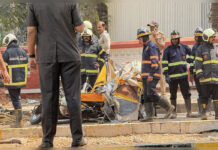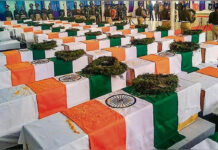X: @the_news_21
In a startling incident, Bharatiya Janata Party (BJP) MLA Ganpat Gaikwad was apprehended on Saturday for reportedly shooting and injuring a leader of the Eknath Shinde-led Shiv Sena inside a police station in Thane district, Maharashtra. The altercation, which unfolded within the confines of the Hill Line police station in Ulhasnagar, has once again thrust political tensions into the spotlight in the region.
According to Additional Commissioner of Police Dattatrya Shinde, the incident transpired on Friday night when Ganpat Gaikwad allegedly fired at Mahesh Gaikwad, the Shiv Sena chief of Kalyan, within the chamber of the senior inspector. The brazen act of violence has sent shockwaves across the political spectrum and raised questions about the safety and security of public spaces, including police stations.
Following the incident, Ganpat Gaikwad, along with two others, was promptly arrested by law enforcement authorities. They have been booked under various sections of the Indian Penal Code, including 307 (attempt to murder) and 120B (criminal conspiracy), as per reports from PTI. The swift action taken by the police underscores the gravity of the situation and the commitment to uphold the rule of law.
Ganpat Gaikwad, a prominent figure in Maharashtra politics, represents the Kalyan East constituency in the state legislative assembly as a member of the BJP. With a political career spanning several years, Gaikwad has secured victory in his constituency thrice consecutively, initially as an independent candidate in 2009 and 2014, followed by winning on a BJP ticket in 2019. However, his political journey has not been devoid of controversies, as reflected in the 18 pending criminal cases against him, as per his 2019 assembly election affidavit.
The recent altercation between supporters of the Shinde faction and the BJP in August had already hinted at simmering tensions in the region. Ganpat Gaikwad’s challenge to Mahesh for a duel in Kalyan East further exacerbated the situation, culminating in the confrontation at the agreed-upon location. The intervention of the Kolsewadi police prevented potential violence but failed to quell the underlying animosities between the political factions.
The incident serves as a stark reminder of the volatile nature of political rivalries and the urgent need for dialogue and restraint to prevent further escalation of violence. As investigations into the matter progress, it is imperative for all stakeholders to prioritize peace and cooperation, steering clear of actions that undermine the democratic fabric of the nation.








cost of generic clomiphene for sale buying generic clomiphene without dr prescription can i order cheap clomiphene prices order generic clomid without rx cost clomiphene without a prescription buying generic clomid pill how can i get clomid pill
ramatogel is one of the online slot gambling sites that is currently popular among slot game enthusiasts
I am in fact enchant‚e ‘ to coup d’oeil at this blog posts which consists of tons of profitable facts, thanks for providing such data.
purchase zithromax for sale – order tetracycline pills flagyl without prescription
semaglutide 14 mg sale – semaglutide 14mg price oral cyproheptadine
order generic domperidone – motilium 10mg usa order cyclobenzaprine 15mg pill
augmentin 1000mg cheap – https://atbioinfo.com/ acillin drug
esomeprazole 20mg for sale – https://anexamate.com/ buy cheap generic esomeprazole
medex brand – anticoagulant brand cozaar
buy mobic pill – https://moboxsin.com/ order mobic online cheap
prednisone 10mg uk – arthritis prednisone 20mg brand
buy ed pills canada – medicine for erectile best drug for ed
where to buy amoxil without a prescription – https://combamoxi.com/ amoxil buy online
buy generic forcan for sale – https://gpdifluca.com/# buy fluconazole 100mg pill
buy lexapro pill – https://escitapro.com/# buy escitalopram sale
cenforce 50mg us – https://cenforcers.com/# oral cenforce 50mg
cialis black 800 to buy in the uk one pill – site cialis online without pres
cialis online canada ripoff – on this site pictures of cialis
viagra sale china – viagra cheap canada where can i buy female pink viagra in the u.k
Greetings! Utter useful advice within this article! It’s the crumb changes which choice turn the largest changes. Thanks a portion quest of sharing! accutane gabapentina 300 mg para que sirve
More posts like this would make the online time more useful. https://buyfastonl.com/furosemide.html
Thanks on putting this up. It’s understandably done. https://ursxdol.com/ventolin-albuterol/
More posts like this would prosper the blogosphere more useful. https://prohnrg.com/product/orlistat-pills-di/
More articles like this would make the blogosphere richer. protocole stromectol poux
With thanks. Loads of knowledge! https://ondactone.com/product/domperidone/
More posts like this would force the blogosphere more useful.
toradol 10mg cost
This is a topic which is in to my callousness… Myriad thanks! Unerringly where can I find the connection details for questions? http://seafishzone.com/home.php?mod=space&uid=2291209
buy dapagliflozin cheap – janozin.com buy dapagliflozin 10 mg
purchase xenical generic – https://asacostat.com/ generic xenical 60mg
Grat post. I used to be checking constantly this weblog and I am impressed!
Extremely helpful info specially the last secttion 🙂 I take care of such info a lot.
I waas looking for this particular information for a long time.
Thank you and best of luck. https://u7bm8.Mssg.me/
With thanks. Loads of expertise! http://3ak.cn/home.php?mod=space&uid=230374
You can protect yourself and your family by way of being heedful when buying panacea online. Some pharmaceutics websites operate legally and sell convenience, solitariness, sell for savings and safeguards to purchasing medicines. buy in TerbinaPharmacy https://terbinafines.com/product/topamax.html topamax
I’ll certainly bring to be familiar with more. aranitidine
More posts like this would prosper the blogosphere more useful.
kuwin sở hữu kho game đa dạng từ slot đến trò chơi bài đổi thưởng, mang đến cho bạn những giây phút giải trí tuyệt vời.
Với giao diện mượt mà và ưu đãi hấp dẫn, MM88 là lựa chọn lý tưởng cho các tín đồ giải trí trực tuyến.
Với giao diện mượt mà và ưu đãi hấp dẫn, MM88 là lựa chọn lý tưởng cho các tín đồ giải trí trực tuyến.
Khám phá thế giới giải trí trực tuyến đỉnh cao tại MM88, nơi mang đến những trải nghiệm cá cược thể thao và casino sống động.
online blackjack number of decks of cards
online casino real money usa no deposit
play online casino
betmgm MN betmgm-play mgm online betting
mcluck Nebraska online casino McLuck mcluck Indiana